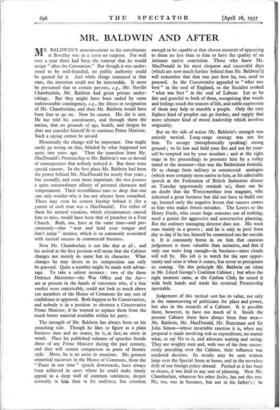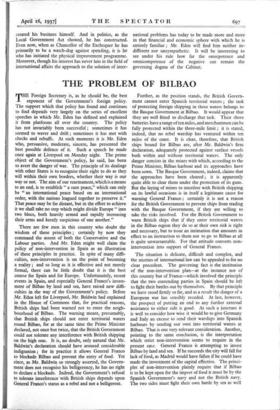MR. BALDWIN AND AFTER
MR. BALDWIN'S announcement to his constituents at Bcwdley was in a sense no surprise. For well over a year there had been the rumour that he would resign " after the Coronation." But though it was under- stood to be well-founded, no public authority could be quoted for it. And while things remained at that state, the intention could not be irrevocable. It must be presumed that to certain persons, e.g., Mr. Neville Chamberlain, Mr. Baldwin had given private under- takings. But they might have been ended by some unforeseeable contingency, e.g., the illness or resignation of Mr. Chamberlain, and then Mr. Baldwin would have been free to go on. Now he cannot. His die is cast. He has told his constituents, and through them the nation, that on grounds of age, health, and fatigue he does not consider himself fit to continue Prime Minister. Such a saying cannot be unsaid.
Historically the change will be important. One might easily go wrong on that, blinded by what happened not quite two years ago. Then the transition from Mr. MacDonald's Premiership to Mr. Baldwin's was so devoid of consequences that nobody noticed it. But there were special reasons. In the first place Mr. Baldwin had been the power behind Mr. MacDonald for nearly four years ; but secondly, and even more important, the two possess a quite extraordinary affinity of personal character and temperament. Their resemblance runs so deep that one can only wonder why it has not oftener been remarked. There may even be remote kinship behind it (for a parent of each man was a MacDonald). For either of them his natural vocation, which circumstances caused him to miss, would have been that of preacher in a Free Church. Both, too, have at the same time—and pre- eminently—that " wait and hold your tongue and don't jump " instinct, which is so commonly associated with tactical success in commercial business.
Now Mr. Chamberlain is not like that at all ; and his arrival at the first position will mean that the Cabinet changes not merely its name but its character. What changes he may desire in its composition can only be guessed. Quite a number might be made with advan- tage. To take a salient instance : two of the three Defence Ministries—the War Office and the Air— are at present in the hands of statesmen who, if a free verdict were conceivable, could not look to much above roc) members of the House of Commons for any sort of confidence or approval. Both happen to be Conservatives, and nobody is in a position to obstruct a Conservative Prime Minister, if he wanted to replace them from the much better material available within his party.
The strength of Mr. Baldwin has always been on his preaching side. Though he likes to figure as a plain business man and no orator, he is, in fact, an artist in words. Place his published volumes of speeches beside those of any Prime Minister during the past century, and they will sustain comparison in point of literary style. More, he is an artist in emotions. His greatest oratorical successes in the House of Commons, from the " Peace in our time " speech downwards, have always been achieved in cases where he could make timely appeal to a deep well of common sentiment, deeper normally in him than in his audience, but common enough to be capable at that chosen moment of appearing to them no less than to him to have the quality of an intimate native conviction. Those who knew Mr. MacDonald in his most eloquent and successful days (which are now much further behind than Mr. Baldwin's) will remember that that was just how he, too, used to proceed. As the Conservative appealed to " what was best " in the soul of England, so the Socialist evoked " what was best " in the soul of Labour. Let us be fair and grateful to both of them, recognising that words and feelings touch the sources of life, and noble expression of them may help to ennoble a people. Only the very highest kind of prophet can go further, and supply that more ultimate kind of moral leadership which involves originality.
But on the side of action Mr. Baldwin's strength was entirely tactical. Long-range strategy was not for him. To occupy (metaphorically speaking) strong ground ; to lie low and hold your fire and not let your- self be tempted out by your assailant ; and at the right stage in his proceedings to prostrate him by a volley timed to the moment—that was the Baldwinian formula. Or to change from military to commercial analogies (which were certainly more native to him, as his admirable speech at the Federation of British Industries dinner on Tuesday opportunely reminds us), there can be no doubt that the Worcestershire iron magnate, who inherited a great business but did not have to build one up, learned early the negative lesson that success comes to him who makes fewest mistakes. The Levers or the Henry Fords, who create huge concerns out of nothing, need a genius for aggressive and constructive planning. But the ordinary managing director does not. His work runs mainly in a groove ; and he is only in peril from day to day if he lets himself be committed too far outside it. It is constantly borne in on him that cautious judgement is more valuable than initiative, and that if only one waits long enough—in business—most clouds will roll by. His job is to watch for the rare oppor- tunity and seize it when it comes, but never to precipitate its coming. On this principle Mr. Baldwin sat silent in Mr. Lloyd George's Coalition Cabinet ; but when the right moment came, at the Carlton Club, he seized it with both hands and made his eventual Premiership inevitable.
Judgement of this tactical sort has its value, not only in the manoeuvring of politicians for place and power, but also in the councils of a Cabinet. It is possible there, however, to have too much of it. Inside the present Cabinet there have always been four men— Mr. Baldwin, Mr. MacDonald, Mr. Runciman and Sir John Simon—whose invariable reaction it is, when any proposal is made involving risk or expenditure, no matter what, to say No to it, and advocate waiting and seeing. They are weighty men and, with two of the four succes- sively presiding over the Cabinet, their influence was rendered decisive. Its results may be seen written large over the Special Areas at home, and in the nerveless drift of our foreign policy abroad. Pushed as it has been to excess, it was fatal to any sort of planning. Now Mr. Chamberlain, whatever his other faults, has not this one. He, too, was in business, but not in his father's ; he created his business himself And in politics, as the Local Government Act showed, he has constructed. Even now, when as Chancellor of the Exchequer he has primarily to be a watch-dog against spending, it is he who has initiated the physical improvement programme. Moreover, though his interest has never lain in the field of international affairs the approach to the solution of inter- national problems has today to be made more and more in that financial and economic sphere with which he is entirely familiar ; Mr. Eden will find him neither in- different nor unsympathetic. It will be interesting to see under his rule how far the omnipotence and omnicompetence of the negative can remain the governing dogma of the Cabinet.























































 Previous page
Previous page